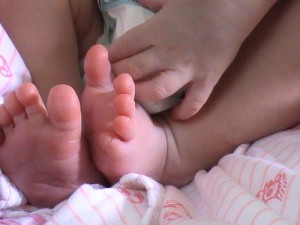It is true that education is instrumental in changing thought processes, yet few beyond the behaviorists give a great deal of thought to how those changes come about. While the content and quality of the education process are essential elements, it is helpful to also understand the internal processes that are the soil in which those changes take root and develop. Swiss developmental psychologist Jean Piaget defined a structure of the developmental stages which provide insight into the evolution of that ‘soil’ and the ways in which the developing mind processes information and uses it to further adapt. It is loosely within that framework that we will discuss how education changes our thought processes, from infancy to adulthood.
1) Early cognitive development
Our earliest ‘education’ occurs well before we enter any form of regimented education system.  At birth, an infant is by definition a narcissist, concerned only with its immediate needs and desires: to be fed, changed, coddled, to have its discomfort soothed, and to be held. When those needs are not immediately met, the infant responds by expressing its displeasure. When the child is fed, changed, or physically soothed, the displeasure – and the infant’s wailing – evaporates. The infant quickly learns that the approach of a parent is a precursor to its needs/wants being satisfied, and will often cease its crying upon seeing the parent approach. It also begins learning how to reproduce pleasurable experiences beyond those that are instinct driven, like clinging to a soft blanket or thumb-sucking.
At birth, an infant is by definition a narcissist, concerned only with its immediate needs and desires: to be fed, changed, coddled, to have its discomfort soothed, and to be held. When those needs are not immediately met, the infant responds by expressing its displeasure. When the child is fed, changed, or physically soothed, the displeasure – and the infant’s wailing – evaporates. The infant quickly learns that the approach of a parent is a precursor to its needs/wants being satisfied, and will often cease its crying upon seeing the parent approach. It also begins learning how to reproduce pleasurable experiences beyond those that are instinct driven, like clinging to a soft blanket or thumb-sucking.
2) Early education and socialization
From the toddler years to about the age of six, the institutional education process is pretty concrete, focusing upon learning to read, count, and perform simple calculations.  The child has begun to develop habits, such as playing, choosing especially palatable foods, and opting for comfortable clothing. At the same time, the child is discovering, through socialization with others beyond the family, that his or her perception of the world is not universally shared. Since the child is still primarily egocentric, his or her reactions to such alien perspectives is likely to be quite judgmental, rejecting any perspective that is foreign to his/her own. It is during this phase that the child learns a degree of tolerance – the initial steps out of that egocentric mode – not so much because of a willingness to consider and embrace foreign concepts as because of his/her growing curiosity, along with a desire to not be shunned.
The child has begun to develop habits, such as playing, choosing especially palatable foods, and opting for comfortable clothing. At the same time, the child is discovering, through socialization with others beyond the family, that his or her perception of the world is not universally shared. Since the child is still primarily egocentric, his or her reactions to such alien perspectives is likely to be quite judgmental, rejecting any perspective that is foreign to his/her own. It is during this phase that the child learns a degree of tolerance – the initial steps out of that egocentric mode – not so much because of a willingness to consider and embrace foreign concepts as because of his/her growing curiosity, along with a desire to not be shunned.
3) The foundations of logic
From the age of about eleven on, the ability to logically reason, calculate, and project expands exponentially. At this point in the development process, the student more willingly considers challenges to previously accepted ideas, which is in itself a double-edged sword.  At the same time that new concepts are being considered, absorbed, and incorporated, the more basic perspectives such as parental wisdom and authority are also being challenged. The educational process strives to present new concepts, while simultaneously helping the student to better understand the value of those once considered sacrosanct, yet which are challenged by the student’s increasingly sophisticated reasoning. It must also be remembered that the student may well have some emotional investment in the acceptance (or rejection) of concepts both new and old, and to consider and address that investment when formulating lessons.
At the same time that new concepts are being considered, absorbed, and incorporated, the more basic perspectives such as parental wisdom and authority are also being challenged. The educational process strives to present new concepts, while simultaneously helping the student to better understand the value of those once considered sacrosanct, yet which are challenged by the student’s increasingly sophisticated reasoning. It must also be remembered that the student may well have some emotional investment in the acceptance (or rejection) of concepts both new and old, and to consider and address that investment when formulating lessons.
4) Embrace or rejection of ideas as social currency
It is human nature to want to agree with individuals one wishes to befriend, and to challenge or even reject ideas proffered by individuals for whom one holds no affection or respect.  This presents a unique challenge to the instructor, who may assume the role of an authority figure, mentor, friend, romantic interest, or opponent. The instructor must strive to be both objective and clear in his/her own perspectives, and by extension, in the presentation of concepts. In addition, the instructor needs to be cognizant of and sensitive to the student’s view of the teacher/student relationship, and to encourage the student to accept or challenge ideas presented on their own merits.
This presents a unique challenge to the instructor, who may assume the role of an authority figure, mentor, friend, romantic interest, or opponent. The instructor must strive to be both objective and clear in his/her own perspectives, and by extension, in the presentation of concepts. In addition, the instructor needs to be cognizant of and sensitive to the student’s view of the teacher/student relationship, and to encourage the student to accept or challenge ideas presented on their own merits.
5) The school of hard knocks
Even the most logical and easily understood concepts can be and often are challenged by circumstance, and the education process continues as individuals find their perspectives – and even deeply held opinions – tested by life experiences.  Education is, of course, a lifelong process. As we grow older and our life becomes more complicated, it becomes more and more difficult to approach and consider new concepts without allowing our experiential base to distort those concepts, often to the point where they are unrecognizable in relation to their original form. New Age platitudes aside, it would benefit us greatly if we could manage to approach new ideas and concepts with the wide-eyed wonder of children, free of the many filters we acquire through the course of our lives.
Education is, of course, a lifelong process. As we grow older and our life becomes more complicated, it becomes more and more difficult to approach and consider new concepts without allowing our experiential base to distort those concepts, often to the point where they are unrecognizable in relation to their original form. New Age platitudes aside, it would benefit us greatly if we could manage to approach new ideas and concepts with the wide-eyed wonder of children, free of the many filters we acquire through the course of our lives.
*Our guest is Rebecca Gray, who writes about free background check for Backgroundchecks.org. She welcomes your comments at GrayRebecca14@gmail.com.
photo credit: bluewinx15(BACK) via photopin cc
photo credit: Pink Sherbet Photography via photopin cc
photo credit: gregorfischer.photography via photopin cc
photo credit: Wonderlane via photopin cc
photo credit: h.koppdelaney via photopin cc
Nowadays this condition is getting very well known across online platforms. i personally know close friends and family members who are having narcissistic traits and after reading many articles about this condition in people i trully understood that this is a real treat when interacting with these type of people. Even if members of familly are having narcissistic traits, we have to learn how to cope with them and their condition. thank you for writting this article.